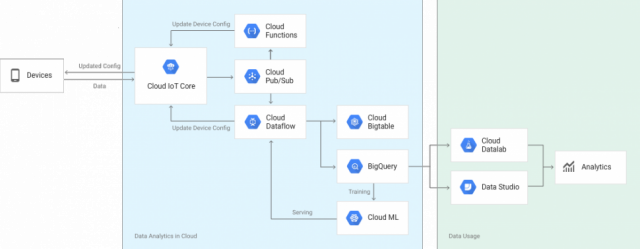
Cisco and Microsoft team up on Internet of Things solutions
Cisco has made a couple of interesting announcements in its IoT space, including a new hardware platform and a collaboration with Microsoft on hybrid IoT solutions.
There are three new components to the Cisco IoT Operations Platform: Connection Management at Scale, Fog Computing and Data Delivery.

UK businesses want to increase adoption of cloud services
The adoption of cloud technologies in a company is becoming a key function of many company’s technology strategy.
Almost nine in ten (88 percent) of UK businesses have adopted cloud to some extent, the report says, adding that two thirds (67 percent) of users expect to increase the adoption of cloud services in the near future, according to a new report by the Cloud Industry Forum (CIF)

HP software helps turn old PCs into thin clients
As software moves towards the cloud, many companies are opting for thin client architecture on the desktop. But this involves an investment in new hardware that may strain restricted budgets.
HP has used this week's Citrix Synergy event to launch its Thin Client Conversion Suite, allowing old PCs to be turned into a thin client solution at low cost.

Microsoft working on DNA-based data storage
Quantum computing is not the only large leap in computing the human race is currently working on, there's also the crazy and amazing research in storing data in DNA.
According to media reports, Microsoft is now planning on building, "an operational storage system based on DNA working inside a data center," by the next decade.

Google Cloud IoT Core helps businesses manage data and devices
Google has announced the launch of a new service to help businesses handle large volumes of data created by their IoT devices.
IoT Core will look to take on the likes of AWS and Microsoft, although a company's spokesperson says that Google is not playing catch up.

VMware to deliver Horizon Cloud on Microsoft Azure
VMware has announced two major announcements with Microsoft and Samsung.
The cloud infrastructure and business mobility firm has announced it will now deliver VMware Horizon Cloud on Microsoft Azure, helping its customers migrate to Windows 10 faster. VMware virtual desktops and applications are now also available to Azure enterprise users.

How the cloud powers enterprise mobility efforts
As enterprise technology advances and more companies turn toward non-traditional, work-from-anywhere solutions, cloud software is rapidly becoming the management platform of choice for enterprise mobility efforts. This digital migration to the cloud is accelerating so quickly that, by 2019, 90 percent of all mobile data traffic is predicted to be generated by cloud software.
Since businesses are heavily leveraging cloud technology to manage their enterprise mobility programs, software developers are evolving to meet this growing contemporary demand. As a result, almost all of today’s cloud solutions are being developed with a mobile-first mindset -- and these solutions are bringing big returns to the organizations that adopt and embrace them.

Is multi-cloud architecture just a fad? [Q&A]
Enterprises often find themselves working with more than one cloud provider. This multi-cloud approach is a lot like hybrid cloud, yet many companies today may not consider this type of environment. If they have, they are more than likely wondering how to manage and govern the data held in separate clouds. They want to know how to find the best use of different architectures in a multi-cloud world.
We spoke to Lief Morin, CEO of infrastructure solutions and managed services company Key Information Systems, to discuss what he's hearing from his clients on multi-cloud strategies and when organizations should skip this type of approach altogether.

Do cloud providers want a 'lock and key' security mechanism?
Public cloud providers have ultimate control over our data, applications, and data flows on their platforms. This capability is the main cause of anxiety and a top reason for many companies to shy away from public cloud.
One of the possible solutions to the problem is to implement a "lock and key" mechanism for public clouds. This would allow re-balancing of data control. The question is whether cloud providers want that.

The cloud computing tidal wave
The title above is a play on the famous Bill Gates memo, The Internet Tidal Wave, written in May, 1995. Gates, on one of his reading weeks, realized that the Internet was the future of IT and Microsoft, through Gates’s own miscalculation, was then barely part of that future. So he wrote the memo, turned the company around, built Internet Explorer, and changed the course of business history.
That’s how people tend to read the memo, as a snapshot of technical brilliance and ambition. But the inspiration for the Gates memo was another document, The Final Days of Autodesk, written in 1991 by Autodesk CEO John Walker. Walker’s memo was not about how the future could be saved, but about how seemingly invincible market advantages could be quickly lost. If Autodesk, the Computer Aided Design pioneer, was ever going to die, this was how Walker figured it would happen. And Gates believed him. Now it’s about to happen again. Amazon Web Services -- the first and still largest public computing cloud -- is 11 years old, which is old enough for there not only to be some clear cloud computing winners (AWS, Microsoft Azure and a bunch of startups) but some obvious losers, too. This rising tide is not raising all ships. That’s why it’s time for the Cloud Computing Tidal Wave.

Microsoft patents technology to block pirate material from cloud storage
A new patent from Microsoft could enable the company to not only identify and block pirate material from being shared via cloud services, but also to identify repeat offenders and take action against them.
The patent specifically refers to the ability to identify and block the sharing of "prohibited content," and this could be used to mean copyrighted material, or files that a company simply does not want to be shared. The technology relies on a fingerprinting technique which makes it possible to identify files rather than having to worry about trying to track down and delete files to prevent further sharing.

Your clouds don't need to clash
Increasingly, two models for cloud are emerging -- the public or shared cloud and private cloud. While the definitions of these models might still be fluid, that has not stopped the rise of loud, passionate defenders of each who are willing to fight to the death to defend the idea that their cloud model will ultimately reign supreme. Needless to say, this "clash of clouds" can be intimidating for many enterprise IT professionals seeking to develop a cloud strategy where it might seem the wrong choice could result in the end of their business (or at least their careers).
Relax.

What's next for the IBM mainframe?
The IBM mainframe has been a stalwart platform for enterprise computing for the last 50 years. There are not many technologies you can point to that have survived that long and remain a key component of many companies’ IT infrastructure. Its survival should be lauded, but the question remains: "Is it the only game in town for enterprise computing?"
That answer is a resounding "No." The mainframe is a combination of hardware and software that is arguably unique to all other computing offerings available in the marketplace today. That doesn’t make it a bad platform, but it does limit its opportunities for growth. It is a proprietary platform, only available from a single vendor -- IBM.

Verizon sells 29 data centers to Equinix for $3.6bn
Global data center company Equinix has bought 29 data centers, along with their operations, from Verizon Communications. Approximately 250 Verizon employees will also become Equinix employees in the process.
The deal, worth $3.6 billion, will be completed in all cash. It includes more than 1,000 customers, 600 of which are net new. Verizon will now, consequently, become a substantially larger customer. It also includes roughly a million square meters of data center space.

New platform simplifies securing cloud workloads
The cloud is a dynamic environment and the threats it faces are equally fluid, whether they're sophisticated cyber attacks or insider threats.
Cloud security company Lacework is launching a new tool called Polygraph that detects breaches, manages insider threats, delivers insights into workloads, and offers graphical investigation tools for public, private and hybrid cloud workloads.
